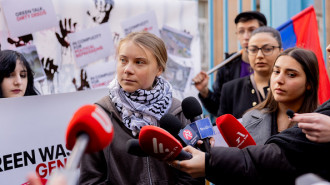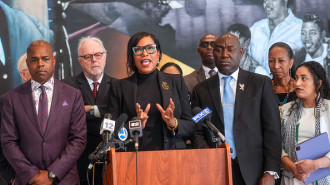Amid an economic crisis, Iraqi parliament’s 'secret' salary hike vote sparks public fury
The Iraqi Parliament's "secret" vote to significantly increase its members' salaries and entitlements has ignited widespread public outrage and intense political controversy.
The decision—concealed from the official agenda during the parliamentary session on 7 August and kept away from media scrutiny—provoked strong reactions across Iraq, where unemployment rates are soaring, and public sector employees are demanding wage increases.
Soran Omar, a Kurdish lawmaker from the Kurdistan Justice Group, told The New Arab that the salary increase for Iraqi lawmakers would elevate their pay to the same level as ministers in the Iraqi federal government. Omar, who did not support the decision, formally expressed his opposition to the parliamentary presidency, citing the lack of transparency and details provided during the vote.
Analysts warn that this move could trigger a wave of protests, as public anger intensifies over the lack of transparency and accountability in the decision-making process, especially when Iraq is grappling with liquidity issues and high unemployment.
"This is a great scandal given Iraq's current situation," Yassin Taha, a Kurdish political analyst, told TNA. He highlighted the dire economic conditions, with thousands of young people unemployed and many others working for very low wages, all while the country’s infrastructure remains in a poor state.
Taha further noted that the decision reinforces previous accusations that the Iraqi Parliament is more focused on personal enrichment rather than serving the public interest. He warned that if the salary increase is finalised, it could inflame ongoing protests demanding employment opportunities and wage increases for public sector workers.
He also pointed out a troubling dynamic in Iraqi politics, where lawmakers are often expected to provide financial support to voters and party loyalists rather than focusing on active parliamentary work. This expectation, he argued, makes even the current parliamentary salaries insufficient to cover such expenditures.
The controversy began on 7 August, when the Iraqi Parliament convened with an agenda listing six items—none of which mentioned a vote on salary increases. During the session, however, parliamentary leadership secretly introduced the salary hike proposal, which was then approved without public knowledge. The decision remained hidden until a leaked document from the parliamentary leadership revealed the details.
An Iraqi lawyer, speaking to TNA on condition of anonymity, revealed that the parliament has the authority to add new topics to its agenda based on requests from some MPs.
The document disclosed that the Parliament had voted to raise the salaries and allowances of its members to match those of ministers. It also included a 30% increase in danger pay for parliamentary staff based on their base salary.
Currently, an Iraqi MP earns between eight and ten million Iraqi dinars (approximately US$6,700) per month, but the increase would raise this to 19 million dinars (approximately US$12,750) per month.
The secretive nature of the vote has drawn sharp criticism from activists and political observers, who pointed out that the Iraqi Constitution mandates that parliamentary sessions be conducted openly. Former officials have condemned the decision, arguing that it targets Iraq's poor and could incite public anger. Some have suggested that instead of raising salaries, the Parliament should have voted to reduce ministerial salaries to align them with those of parliamentarians.
In response to the growing controversy, Iraqi MP Ahmed al-Sharmani declared to local media outlets that the decision was "invalid" and threatened to take the matter to the Federal Supreme Court if the parliamentary leadership does not reverse it. Fellow MP Zohair al-Fatlawi also criticized the secret vote, stating, "The secret vote to increase MPs' salaries is unjustifiable and seems to provoke millions of Iraqis."
Despite the widespread backlash, the Iraqi parliamentary leadership has yet to issue any clarification regarding the vote. It remains unclear why the leadership chose to conduct the vote in secret, and whether any specific political pressures influenced the decision.







 Follow the Middle East's top stories in English at The New Arab on Google News
Follow the Middle East's top stories in English at The New Arab on Google News


